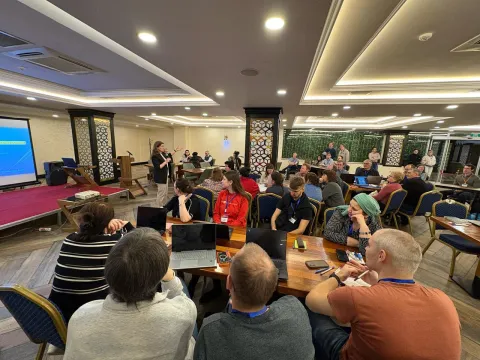A seminar for translators on key biblical terms was held in Baku, Azerbaijan on February 17-20, 2025. Translation team members from 22 oral and written Bible translation projects participated. Most of the projects represented at the seminar are translating Scripture into Caucasian languages, while one of the projects is focusing on the Evenki language of Siberia.
Key terms are words that bear a heavy load in conveying the unique cultural and theological meaning of the biblical text. Thus, many key terms associated with Jewish culture have a unique and stable meaning. For example, “synagogue” usually refers to the same phenomenon each time it occurs in the text of Scripture, as do “temple” and “law”. Words characteristic of Christianity can also be considered key terms: “baptism”, “apostle”, etc. But there are also key terms that take on special meanings depending on the specific Biblical context in which they occur, such as the Greek word πνεύμα. This has three related but distinct meanings that are translated into English with different words: “spirit”, “breath” and “wind”. Furthermore, the meaning of each sub-sense can also vary depending on the context. Conveying the nuances of "evil spirit," "ministering spirit," and "Spirit of God" into their mother tongue is just one of the difficulties that translators face.
The seminar program consisted of four sessions per day. The first two were introductory sessions covering a five-step methodology: 1. explore the meaning of the original term; 2. compare similar words; 3. work through possible solutions; 4. choose the most appropriate term; 5. check the correctness of one's choice.
The seminar brought together translators with different levels of experience, both those just starting their projects and those with already many years of experience in Bible translation behind them. Depending on their level, participants were presented with ancient terms of varying complexity to analyze from the New Testament. Their task was to create a terminological system in their own language that would reflect the different contextual meanings of the original ancient Greek term. After completing their work, the group presented their results and had a lively discussion about their findings.
A few of the sessions were devoted to Old Testament terminology to help translators become familiar with the Hebrew source text behind the Old Testament.
Most of the participants found the seminar very productive. Newcomers had the opportunity to discuss their work with experienced translators and experts, while those who have been translating for a long time reviewed their previously translated books and fine-tuned their choices.
The seminar also emphasized the importance of inter-project cooperation. Participants had the opportunity to make new contacts and learn about the activities of other projects and specific issues faced by different languages.

